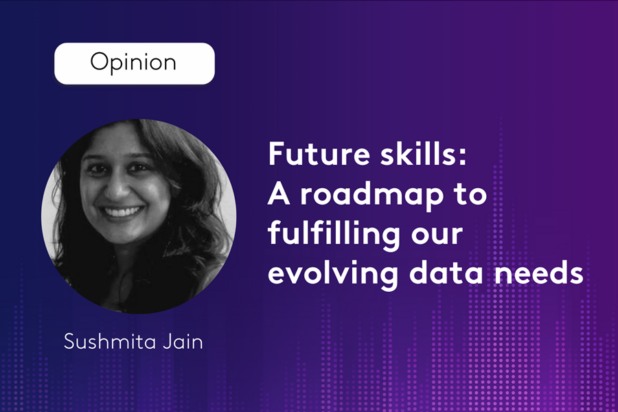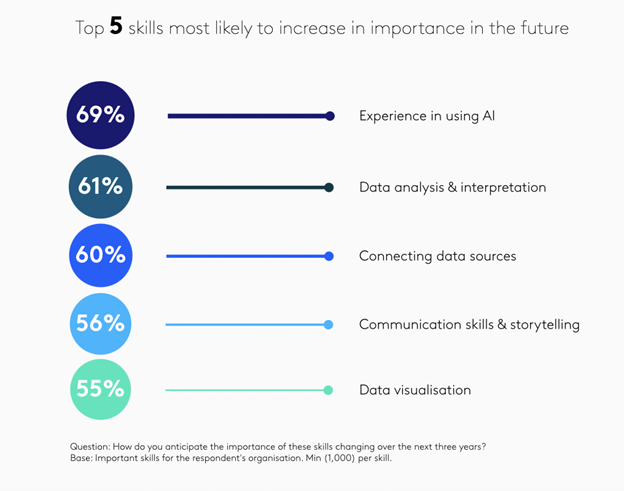Sushmita Jain examines the media sector’s changing skills landscape, exploring how businesses can attract and retain top talent for a future defined by AI and big data

I love being a data scientist. It’s not just about my love of numbers, analytics, or statistics – of which there is today an abundance; it’s because it’s a truly interdisciplinary role that harnesses data to solve increasingly complex problems, drive key decisions, and shape strategies. In recent years, it’s also a role that has evolved dramatically, requiring data scientists to become vital strategic partners, influencing how organisations approach projects and markets.
This evolution is driven by rapid changes in the broader market, particularly the rise of new media technologies and the expansion of data and data sources, which are reshaping business operations. For media companies leveraging data – whether buyers or owners – the challenge is no longer just adapting to these changes, but keeping pace. Indeed, Kantar Media’s recent global skills survey reveals that 72% of senior media professionals see an urgent need to reshape their teams’ skill sets to stay ahead of these technological shifts.
Yet, this transformation poses a uniquely human challenge. Success will depend not only on attracting new talent capable of managing vast, complex data sets and generating actionable insights, but also on upskilling and retaining the current workforce – a task that requires deeper considerations such as personal fulfilment and workplace culture, especially as other sectors are fiercely competing for these in-demand skills.
Based on my experiences leading a global data science team working on hundreds of unique client challenges and industry-wide solutions, this article delves into the media sector’s evolving skills landscape, exploring how businesses can cultivate these capabilities internally. We will also look at the challenges in recruiting and retaining skilled personnel to meet the shifting needs of the industry over the coming years.
The evolving role of data scientists
Data science has become a central, multifaceted skill in media operations. This shift is demonstrated by the fact that nearly half of the professionals surveyed report that artificial intelligence – alongside machine learning and data analytics – significantly influences their organisations. Moreover, the majority agree that proficiency in AI will be essential for future hires, highlighting the evolving role of data scientists.
I certainly see this on the ground. Data scientists must continuously adapt their skill sets as new technologies, tools and methodologies – such as large language models and cloud-based systems – arise. This requires businesses to make continuous learning and development a key priority, and is something we at Kantar Media take very seriously, whether that’s internal or external training.

However, technical expertise alone is no longer enough. The ability to communicate effectively and collaborate with non-technical teams and senior executives is also essential to ensure data-driven insights align with broader business strategies.
As my colleague Rachel Macey has written, we see this in the cross-industry need for storytelling skills to create meaning out of data, and communicate value, ideas and vision.
Consequently, over the last decade data scientists have needed to not only evolve their technical skill sets, but also develop more creative skills to help translate data and insights into clear and compelling narratives.
However, it’s impractical to expect data scientists – or anyone – to constantly acquire new skills, as if one role can meet all a business’s demands, especially when those skills differ from the innate abilities foundational to the discipline. Businesses should instead focus on creating truly diverse teams where individuals are free to build on their essential data skills with more specialist ones, such as coding, storytelling, strategy and data visualisation.
Ultimately, we must ensure that teams are equipped to tackle varied and innovative solutions to both internal and client-based challenges – and with an eye on both the present and the future.
That is why, as our survey suggests, it is essential our sector fosters a lasting openness to recruit new and diverse talent streams to ensure we have lots of different thinkers and ways of approaching challenges – including marketing our industry to graduates and fishing in less traditional talent pools. (Our survey states that 70% of respondents believe there is still work to be done in attracting talent from all backgrounds).
Furthermore, we need to consider what makes our talent satisfied. Data scientists flourish when engaged with varied projects and have ongoing opportunities to grow. Implementing flexible, tailored training programs, including opportunities for external certifications or involvement in pioneering projects, is essential.
Moreover, fostering a collaborative environment where data scientists are integral to the organisation’s strategy enhances their sense of value and motivation. Enabling them to work across departments ensures they remain engaged and contribute to the broader business objectives.
Finally, it’s not just about the changing role of the data scientist, but the broader data literacy across the industry that will shape our future success. As media fragments and becomes more complex, it’s increasingly valuable for everyone to have a working grasp of the basics of data methodology. This not only allows for smoother collaboration, but also enables cross-functional teams to make more informed, strategic decisions alongside their data science partners. The ability to understand, interpret, and discuss data with clarity is no longer the sole responsibility of the data science team; it’s becoming an essential skill for all stakeholders in today’s data-driven market.
To thrive in this environment, businesses must cultivate a culture where data literacy is prioritised and where dialogue about data insights is encouraged. By bridging the knowledge gap between technical and non-technical teams, we can ensure that data-driven solutions are not only created but are comprehensively understood and effectively implemented throughout the organisation and in client interactions. Equipping everyone with the ability to appreciate and utilise data fully transforms challenges into opportunities, setting the stage for collective success in a data-centric world.